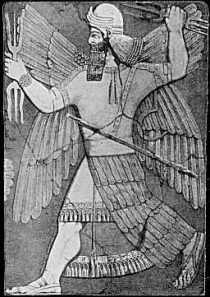Mortality Defined
After Enkidu's death, Gilgamesh faces his own mortality, the idea that he will die, with great fear. He embarks on a journey, symbolic in many ways, to find the one person who has escaped the clutches of death, a man named Utnapishtim.
This attempt to delay or get around mortality is one of the primary struggles of much of Western literature and philosophy. We see this writ large in the pages of such well-known works as Doctor Faustus. However, the theme hides behind many of the attempts to get around the prophecies of the ancient world as well. One need think only of the prophecy to the parents of Oedipus that he would kill his father and marry his mother. The attempt to kill Oedipus is an attempt by King Laius to preserve and extend his own fated death, to avoid his mortality.
So we see that Gilgamesh's search for eternal life is not all that different from people today cryogenically freezing themselves for a future when their diseases will be cured. The science fiction movie, Prometheus, explores this same concept from a vantage point of setting up the Alien series of movies.
The Search for Everlasting Life
Gilgamesh travels for many days to the mountains where Utnapishtim dwelt. He finally came to the dwelling of Utnapishtim who questioned the king as to his motives for seeking eternal life. At this point in the narrative is also found one of the most intriguing aspects of the Epic of Gilgamesh: a Babylonian Flood narrative.
The Flood
 Utnapishtim tells Gilgamesh the circumstances of his gaining eternal life and surviving the flood that the gods sent to destroy all mankind. The Epic of Gilgamesh tells the story of the flood by indicating that the gods, specifically Enlil, were annoyed that mankind was being too loud and making it hard to sleep. Enlil proposes the destruction of the whole world because of this. The other gods, except Ea, seem to agree to this and allow him to play it out. Ea warns Utnapishtim of the coming flood and tells him to make a vessel (I am purposely avoiding the familiar term, ark, so as not to confuse readers of the Bible) to escape in.
Utnapishtim tells Gilgamesh the circumstances of his gaining eternal life and surviving the flood that the gods sent to destroy all mankind. The Epic of Gilgamesh tells the story of the flood by indicating that the gods, specifically Enlil, were annoyed that mankind was being too loud and making it hard to sleep. Enlil proposes the destruction of the whole world because of this. The other gods, except Ea, seem to agree to this and allow him to play it out. Ea warns Utnapishtim of the coming flood and tells him to make a vessel (I am purposely avoiding the familiar term, ark, so as not to confuse readers of the Bible) to escape in.
After Utnapishtim builds the vessel, the flood begins. Even the gods are terrified at the awesome destruction the flood wreaks and flee the realm of men. The immediately regret having caused such destruction. Ishtar, herself, realizes she has ordered the destruction of those that she brought forth and give her daily worship.
The flood lasts for six days and six nights. Utnapishtim remains in his vessel for another seven days, letting various animals out to test the world to see if it was safe to leave the vessel.
After seven days, Utnapishtim and his family leave the vessel and offer sacrifices to the gods. Smelling the sacrifice and wondering who, in the midst of all this destruction, could still remember and reverence the gods, several gods make their way to Utnapishtim's location. Many of the gods are so enamored by this sacrifice that they grant to Utnapishtim eternal life. Enlil, the god who started all of this anyway, is very upset that any men survivied. The other gods gang up on him and expel him from their number, temporarily anyway.
Gilgamesh's interview with Utnapishtim
After hearing this story, Gilgamesh is still very intent on learning how he, who has not survived a flood and hasn't got the best track record at pleasing the gods, can gain eternal life. Utnapishtim tells him he must stay awake for a week and then he will be told how to live forever. Gilgamesh is eager for this and agrees immediately. And then proceeds to fall asleep as soon as Utnapishtim begins talking. Utnapishtim bakes a loaf of bread every day that Gilgamesh is asleep and ends up with five loaves when he finally wakes up. Gilgamesh suggests that he had just dozed off for a second, but then is shown the loaves of bread. Gilgamesh is humiliated but remains calm. He leaves Utnapishtim without the secret to eternal life.
A second chance at eternal life
As he is leaving, he is told that a flower grows at the bottom of a lake and is guarded by a serpent and is the key to eternal life. If he can retrieve it, he will gain what he seeks. Gilgamesh swims to the bottom of the lake, retrieves the flower, but loses it to the serpent. He returns to Uruk still a mortal. Though he has learned to embrace his mortality.
The End of Gilgamesh
After returning from his journey, Gilgamesh continued to rule Uruk. However, his reign from that point is remembered with joy by his subjects rather than the fear they had at the beginning of the narrative.
In the next installment, I will expound what I consider to the main Great Ideas covered in the Epic of Gilgamesh and why it belongs in a list of Great Books.